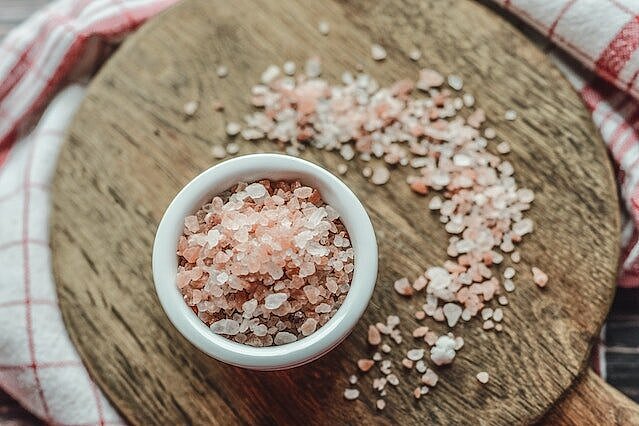Hydrochloric acid

What is hydrochloric acid?
Hydrochloric acid is a chemical compound of hydrogen and chlorine dissolved in water. It has the formula HCl and is one of the strongest acids there is. It has a very low pH value, which indicates how acidic a solution is. The lower the pH value, the more acidic the solution.
A dog's stomach acid consists mainly of water and hydrochloric acid. The hydrochloric acid is formed in special cells of the stomach lining and released into the stomach. The concentration of hydrochloric acid in gastric acid is around 0.5-0.6% in dogs and around 0.3-0.5% in humans. The pH value of stomach acid in dogs is between 0.5 and 2, depending on whether the dog is fasting or has eaten.
What are the benefits of hydrochloric acid?
Hydrochloric acid has several important tasks in a dog's digestion:
- It breaks down the food slurry that the dog swallows and makes it more fluid. This makes it easier to transport into the intestine.
- It prepares the food for breakdown in the intestine. It activates certain enzymes that break down proteins and fats. It also dissolves minerals from the food, which can then be absorbed in the intestine.
- It kills pathogens that may be present in the food. These include bacteria, fungi, viruses and parasites. Hydrochloric acid therefore protects the dog from infections and poisoning.
Hydrochloric acid is particularly important for dogs that eat meat. Meat contains many proteins and fats that are difficult to digest. It can also be contaminated with germs that can harm the dog. Hydrochloric acid helps the dog to digest the meat effectively and protect itself from diseases.
What are the disadvantages of hydrochloric acid?
However, hydrochloric acid can also lead to problems if it is produced too much or too little. Over-acidification or under-acidification of the stomach can cause various symptoms:
- Hyperacidity means that there is too much hydrochloric acid in the stomach. This can happen if the dog eats too much or too intolerable food or if it is stressed. The excess hydrochloric acid irritates or damages the stomach lining and can lead to inflammation. This is called gastritis. Acidosis can also cause the hydrochloric acid to flow back into the oesophagus, causing pain and burns. This is called reflux or heartburn.
- Under-acidification means that there is too little hydrochloric acid in the stomach. This can happen if the dog suffers from a chronic illness or if it is taking medication that inhibits acid production. The lack of hydrochloric acid impairs digestion and the defense against germs. The dog may suffer from flatulence, diarrhea or vomiting. It can also become more susceptible to infections.
The symptoms of impaired stomach acid can vary depending on the severity. The most common signs include
- Loss of appetite or reluctance to eat
- Eating grass or soil
- Vomiting of food, mucus or foam
- Belching or burping
- Bad breath or sour odor
- Abdominal pain or cramps
- Weight loss or emaciation
- Fatigue or weakness
If you notice one or more of these symptoms in your dog, you should consult a vet. They can determine the cause of the stomach acid disorder and initiate appropriate treatment.
How can you optimally support your dog's stomach acid?
To keep your dog's stomach acid in balance, you can take a number of measures, particularly with regard to feeding. Here are some tips you can follow:
- Feed your dog high-quality food that is appropriate for his age, size and activity level. Avoid food that contains too much sugar, salt, fat or artificial additives.
- Feed your dog in several small portions throughout the day. This will prevent the stomach from becoming overfilled and producing too much acid.
- Give your dog plenty of fresh water to drink. This dilutes the stomach acid and flushes it into the intestines.
- Avoid moving your dog just before or after eating. This can irritate the stomach and promote acid reflux.
- Reduce stress for your dog. Stress can stimulate acid production and weaken the stomach lining. Provide a calm and relaxed environment for your dog and give him enough attention and activity.
In addition to feeding, you can also use some home remedies that can calm your dog's stomach acid. These include:
- Chamomile tea: Chamomile has an anti-inflammatory and antispasmodic effect. You can give your dog lukewarm chamomile tea to drink or mix it into their food with a little honey.
- Healing clay: Healing earth binds excess acid and protects the stomach lining. You can add some healing clay to your dog's water or food. Make sure that you only use natural healing clay without additives.
- Coconut oil: Coconut oil has an antibacterial and anti-inflammatory effect. You can add some coconut oil to your dog's food or put it directly in his mouth. Make sure that you only use cold-pressed organic coconut oil.
These home remedies can help with mild symptoms, but are no substitute for a visit to the vet for more serious symptoms.
Hydrochloric acid is an important component of a dog's stomach acid. It has various benefits for digestion and the defense against germs, but can also lead to disadvantages if it is produced too much or too little. Over-acidification or under-acidification of the stomach can cause various symptoms that you should take seriously. In order to optimally support your dog's stomach acid, you should pay particular attention to a healthy and balanced diet. You can also use some home remedies that can calm stomach acid.
If you notice any signs of hypersensitivity or poisoning in your dog, you should see your vet immediately. We are not a substitute for a vet, but we try to be as accurate as possible. Every dog reacts differently and we recommend you get a second opinion or consult your vet if in doubt.
Stay healthy and take good care of your four-legged friend!😊
Similar to Hydrochloric acid
Salt is a mineral consisting of sodium and chloride. It is found in nature, for example in seawater, rocks and plants. Salt is vital for all living things, as it fulfills many important tasks in the...
Sulphuric acid is a chemical compound of sulphur, hydrogen and oxygen with the formula H2SO4. It is a colorless, oily and very viscous liquid that dissolves well in water. Sulphuric acid is one of...
Citric acid is a weak acid that lowers the pH value of solutions. It is a natural preservative that inhibits the growth of bacteria. It is also used as a flavor enhancer, acidifier and antioxidant....
The optimum amount of folic acid for your dog depends on various factors such as age, size, state of health and diet. As a rule of thumb, dogs need around 0.08 to 0.18 milligrams of folic acid per...



